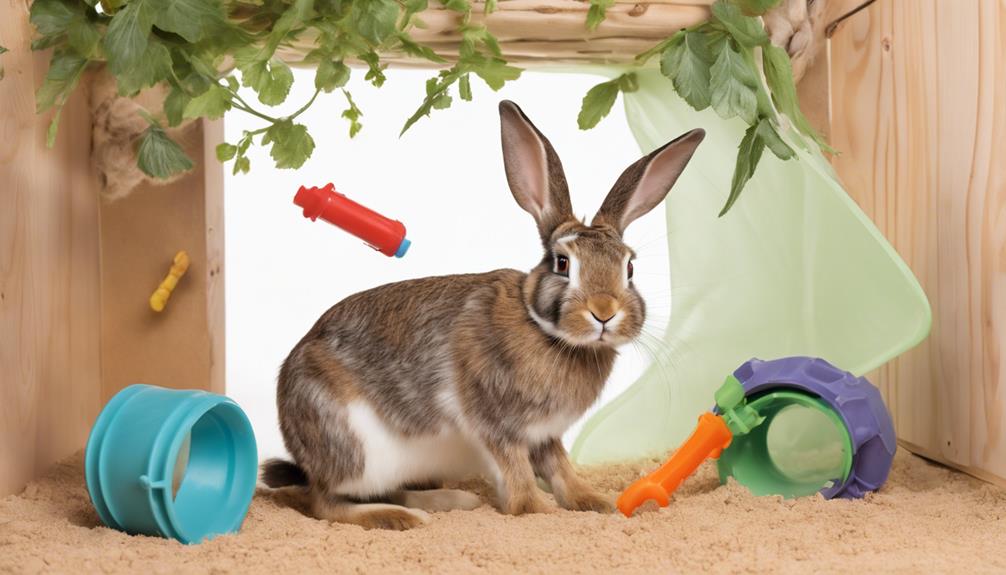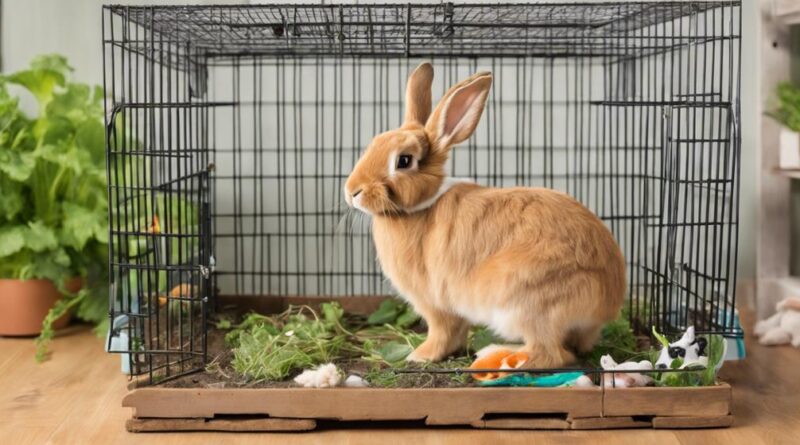What Determines the Average Lifespan of Pet Rabbits?
Have you ever wondered what truly dictates how long your pet rabbit will live?
The lifespan of a pet rabbit can be influenced by various factors that you might not have considered.
From genetic predispositions to the environment in which they live, there are multiple aspects that can impact your rabbit's longevity.
By understanding these determinants, you can ensure that your furry companion lives a healthy and fulfilling life.
Factors Affecting Rabbit Lifespan
Factors impacting a rabbit's lifespan include genetics, diet, living environment, and veterinary care. However, two often overlooked elements that play a significant role in determining the lifespan of a pet rabbit are social companionship and mental stimulation.
Social companionship is crucial for the overall well-being of your rabbit. Rabbits are social animals by nature and thrive in the company of their own kind. If a rabbit is kept alone for extended periods, it can lead to loneliness, stress, and even depression, ultimately impacting its health and longevity. Therefore, it's important to consider providing your rabbit with a compatible companion to ensure they've the social interaction they need to lead a fulfilling life.
In addition to social companionship, mental stimulation is equally important for a rabbit's longevity. Rabbits are intelligent creatures that require mental challenges to prevent boredom and promote a healthy mind. Providing toys, puzzles, tunnels, and opportunities for exploration can keep your rabbit engaged and mentally stimulated. This not only enhances their quality of life but also contributes to their overall happiness and well-being, ultimately impacting how long they may live.
Genetic Influences on Rabbit Longevity
Understanding the genetic factors that influence a rabbit's lifespan is essential for predicting their longevity and overall health. Inheritance patterns play a significant role in determining how long a rabbit may live. Longevity studies have shown that certain genetic traits can impact a rabbit's lifespan.
Inheritance patterns in rabbits follow specific genetic rules. For instance, certain breeds may have genetic predispositions to live longer due to their genetic makeup. Conversely, other breeds may inherit genes that make them more susceptible to health issues that can shorten their lifespan. By understanding these inheritance patterns, breeders and rabbit owners can make informed decisions to promote the longevity of their pets.
Longevity studies have provided valuable insights into the genetic influences on rabbit lifespan. Researchers have identified genes associated with longevity in rabbits and have observed how these genes can be passed down through generations. By studying the genetic markers linked to longer lifespans, scientists aim to develop strategies to enhance the health and lifespan of pet rabbits.
Impact of Diet on Rabbit Lifespan
Considering the importance of nutrition in maintaining your pet rabbit's health and longevity, evaluating the impact of diet on their lifespan is crucial. Meeting the nutrition requirements of your rabbit is vital for their overall well-being and longevity. A balanced diet plays a significant role in ensuring that your rabbit lives a long and healthy life.
To support your rabbit's lifespan, it's essential to understand their nutrition requirements. Rabbits are herbivores with complex digestive systems that require a diet high in fiber. Hay should be the foundation of your rabbit's diet, providing essential nutrients and aiding in digestion. Additionally, fresh vegetables and a limited amount of pellets can complement their diet, ensuring they receive a variety of nutrients.
Dietary restrictions are also crucial in determining your rabbit's lifespan. Foods high in sugar and fats should be avoided, as they can lead to obesity and related health issues. Certain vegetables and fruits should be given in moderation due to their high sugar content. Moreover, foods that are toxic to rabbits, such as chocolate and avocado, should never be included in their diet.
Housing and Environment for Rabbits
To ensure the well-being and longevity of your pet rabbit, creating an appropriate housing and environment is essential. Here are some key factors to consider:
- Socialization Benefits: Rabbits are social animals and thrive in the company of their own kind. Providing your rabbit with opportunities for social interaction, either with other rabbits or with yourself through gentle handling and playtime, can greatly enhance their well-being and reduce stress levels.
- Enrichment Activities: Rabbits are intelligent creatures that require mental stimulation to prevent boredom and promote overall health. Offer them toys to play with, tunnels to explore, and different textures to dig into. This not only keeps them physically active but also engages their minds, preventing behavioral issues that may arise from stress or monotony.
- Housing Size: The size of your rabbit's living space is crucial for their comfort and longevity. Ensure that their enclosure is spacious enough for them to stretch, hop, and stand up on their hind legs without restriction. A larger living area allows for more exercise, which is vital for maintaining a healthy weight and preventing obesity-related health problems.
Exercise and Its Role in Rabbit Longevity
Regular exercise plays a crucial role in extending the lifespan of pet rabbits by promoting their overall health and well-being. Establishing playtime routines is vital to ensure your rabbit gets enough physical activity. Engaging in activities like hopping, running, and exploring not only keeps your rabbit physically fit but also provides mental stimulation, preventing boredom and potential behavior issues.
Monitoring your rabbit's activity levels is essential to tailor their exercise regimen to their individual needs. Some rabbits are naturally more active than others, so it's crucial to observe your pet's preferences and adjust playtime accordingly. Incorporating toys and tunnels in their living space can encourage them to move around and stay active.
Regular exercise helps prevent obesity in rabbits, which can lead to various health issues and a shortened lifespan. By promoting a healthy weight and strong muscles, physical activity supports your rabbit's overall well-being. Additionally, exercise aids in maintaining good circulation, digestion, and dental health.
Make sure to provide a safe environment for your rabbit to exercise in, free from hazards and predators. Supervising playtime can prevent accidents and ensure your rabbit stays out of trouble. Remember, a happy and active rabbit is more likely to lead a long and fulfilling life.
Healthcare and Preventive Measures for Rabbits
What essential healthcare measures should you take to ensure the well-being of your pet rabbit? Here are some crucial steps to keep your rabbit healthy and happy:
- Grooming Techniques: Regular grooming is vital for your rabbit's health. Brushing your rabbit's fur helps prevent matting and reduces the risk of hairballs. It also gives you the opportunity to check for any skin issues or abnormalities.
- Health Supplements: Providing your rabbit with essential vitamins and minerals can support their overall health. Consult with your veterinarian to determine if your rabbit would benefit from any specific supplements to ensure they receive a well-balanced diet.
- Parasite Prevention and Dental Care: Parasites like fleas and mites can cause discomfort and health problems for your rabbit. Regularly check your rabbit for signs of parasites and consult your vet for appropriate prevention measures. Additionally, dental care is crucial for rabbits as their teeth continuously grow. Providing chew toys and ensuring a proper diet can help prevent dental issues.
Behavioral Considerations for Rabbit Lifespan

Ensuring a long and healthy lifespan for your pet rabbit involves understanding and addressing key behavioral considerations. Social companionship plays a crucial role in the overall well-being of rabbits. These social creatures thrive when they've a compatible companion to interact with. Introducing another rabbit can provide mental stimulation, prevent loneliness, and encourage natural behaviors like grooming and playing together. However, it's important to carefully introduce new companions to avoid conflicts and ensure a harmonious relationship.
Stress management is another vital aspect of promoting a rabbit's longevity. Rabbits are sensitive animals that can easily get stressed by changes in their environment, loud noises, or sudden movements. Providing a safe and quiet living space is essential for their mental health. Additionally, enrichment activities such as puzzle feeders, hiding spots, and toys can keep rabbits engaged and mentally stimulated, reducing stress levels.
Recognizing Signs of Aging in Rabbits
How can you identify signs of aging in your pet rabbit? As your furry companion grows older, it's essential to be vigilant about changes that may indicate declining health. Here are some key aspects to consider:
- Changes in Activity Levels: Keep an eye on your rabbit's daily routines. If you notice a significant decrease in energy or reluctance to engage in activities they once enjoyed, it could be a sign of decline.
- Weight Fluctuations: Regularly monitor your rabbit's weight to ensure they're maintaining a healthy balance. Sudden weight loss or gain without changes in diet or exercise may indicate underlying health issues.
- Dental Problems: Aging rabbits are prone to dental issues such as overgrown teeth or abscesses. Watch out for signs like drooling, decreased appetite, or difficulty eating, as these could signal dental problems that require immediate attention.
Health monitoring plays a crucial role in ensuring your rabbit's well-being as they age. By being observant and proactive in recognizing signs of aging, you can provide the necessary care and support to help your furry friend maintain a good quality of life for years to come.
Frequently Asked Questions
Can Pet Rabbits Live Longer if They Are Kept Indoors Rather Than Outdoors?
Living indoors can potentially extend the lifespan of your pet rabbit compared to being outdoors. Indoor living provides a controlled environment that can protect your rabbit from predators and extreme weather conditions.
You can ensure a healthier lifestyle by closely monitoring their diet and exercise routines indoors. This can contribute to your rabbit's overall health and well-being, potentially leading to a longer and happier life for your furry friend.
Are There Any Specific Breeds of Rabbits That Tend to Live Longer Than Others?
When it comes to specific breeds of rabbits that tend to live longer, factors like dietary habits, genetics, exercise routines, and environment play crucial roles.
Some breeds may have genetic predispositions that affect their lifespan. Additionally, proper nutrition and a suitable living environment can contribute to a longer and healthier life for your pet rabbit.
Be mindful of these aspects to help maximize your rabbit's longevity and well-being.
How Does a Rabbit's Social Environment Impact Its Lifespan?
Having a positive social environment is key to your rabbit's health and longevity. Social interaction, companionship, and mental stimulation are crucial for their well-being.
Providing environmental enrichment and reducing stress can significantly impact their lifespan. Ensure your rabbit has companionship, engaging activities, and a stress-free environment to promote a longer and healthier life.
Can Regular Grooming and Hygiene Practices Extend a Rabbit's Lifespan?
Regular grooming and hygiene practices are vital for extending your rabbit's lifespan. By keeping your rabbit clean and free of parasites, you can prevent various health issues.
Additionally, providing regular exercise and a proper diet will contribute to your rabbit's overall well-being and longevity. Remember, a clean bunny is a healthy bunny, so make sure to prioritize grooming and hygiene in your care routine.
Are There Any Seasonal Factors That Can Affect a Rabbit's Longevity?
Seasonal factors like extreme temperatures or humidity can impact a rabbit's well-being. It's crucial to adjust climate conditions in their living space accordingly.
Dietary habits should also be monitored, ensuring they're getting proper nutrition year-round.
Exercise routines play a role too, as rabbits need to stay active regardless of the season.
Regular veterinary care can help address any seasonal health issues promptly, contributing to your rabbit's longevity.
Conclusion
In conclusion, the average lifespan of pet rabbits is determined by a combination of genetic factors, diet, environment, exercise, healthcare, and behavioral considerations.
By providing a healthy diet, proper housing, regular exercise, and veterinary care, you can help ensure your rabbit lives a long and happy life.
Paying attention to signs of aging and making adjustments as needed will also contribute to your rabbit's overall wellbeing and longevity.
